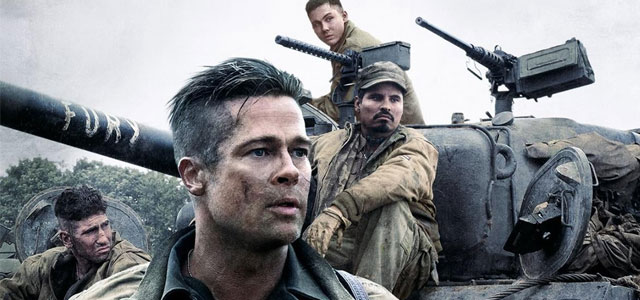(MA) Distributor: Warner Home Entertainment
‘Ideals are peaceful. History is violent.’ Wardaddy
A German officer is riding a beautiful, white horse through a battlefield. The field is murky and covered with the devastation of war. Suddenly, from behind a tank, a US soldier jumps on the officer, kills him and frees the horse. The soldier casually gets back into his tank and heads off to base camp with his crew.
The opening scene to Fury is raw, brutal and shocking. David Ayer’s (End of Watch) new film shows harsh war-time realities from the perspective of soldiers in a tank division, during WWII. Fury is the name of their tank and is a metaphor for their existence. The film is set in April of 1945, when the Allies are making their final push towards Berlin and the end of the war. The Americans’ ground war is heavily reliant on the armour and firepower of Sherman tanks. Fury provides a view from within the heart of the tank and how the men contend with the challenges of close quarters — as well as the fear of the tank becoming a potential coffin.
The battle-hardened crew is led by army sergeant Wardaddy (Brad Pitt). Together for many years, they have fought the Nazis in Africa and Europe. Dependence on each other for survival is evident, but understandable tensions within the tank lead to a fascinating study of camaraderie and mateship. When one of their close-knit crew is killed in action, a new man joins. Norman (Logan Lerman), a clerk typist, has to learn to drive the tank and is soon exposed to the brutal nature of war. He quickly learns from Wardaddy and the crew that, to survive, he has to come to terms with the “us or them” mentality of combat. Pushed into a position of leadership, the Fury crew must protect an infantry platoon throughout the countryside and towns of Germany. Eventually, they are left with the assignment of confronting a final wave of German SS soldiers. The Fury crew finds itself out-numbered, out-gunned and they have to determine if they will make a sacrificial stand.
Ayer has put together a brutal and visceral depiction of wartime, as the backdrop to a story about the interconnected nature of men at war. The landscape and battles are well filmed, but do not leave any false pretences of glory. Each battle brings a devastating reality to the war effort, as well as an understanding of the mindset of the men put into these surreal situations. Seeing the atrocities that mankind can do to one another — in loss or victory — is sobering. It also is a stark contrast to many epic war films of the past.
Pitt delivers a stellar performance as Wardaddy and is at his stoic best. He shows the strength needed for an effective leader, but through the many layers of a battle-hardened, soul he is able to convey a vulnerability and love for his men. He is surrounded by a crew who form an effective, but flawed symbiotic unit.
Shia LaBeouf has been given one of the best roles of his career and he takes it on with unapologetic fervour. He plays Boyd “Bible” Swan and is the heart and conscience of the tank crew. Easily, as Swan quotes Bible passages, he could have been portrayed as a cliché. But this is not the case. Swan is presented as being willing to get into the fight alongside his crewmen. He also holds his own, in verbal battles with anyone willing to listen to him. He is loved by his crew and is never trivialised because of his beliefs. The final interchange of Bible quotes, between Swan and Wardaddy, is refreshing as well as revealing a new depth to their friendship and mutual respect.
Michael Peña and Jon Bernthal round out the cast, as journeymen who add the needed comic relief and relationship-bonding for this type of film. The surprise of Fury, though, was Lerman’s performance. Coming off his support role in Noah, Lerman has shifted from teenage actor to adult contender and is proving to be a mature actor to watch. Throughout the film, his character Norman quickly grows from innocence to maturity. Lerman effectively conveys this critical transformation.
This war-time film is, truly, a character play that develops some great roles. Fury also does not pull any punches when it comes to depicting the realities of war. The violence, the language and conversations of men who have been through so much together, demands a warning for viewer discernment. This is not a film for young audiences, or for the faint hearted. Fury does not push the violence to excess, as it never seems gratutious. The gritty reality of war is conveyed, as is the related value of camaraderie. Ayer has crafted a great film that does not glorify war but, instead, shows how something glorious can come from it (besides victory in battle).
In an era where videogames can cause desensitisation to violence, well-crafted Fury shows the realities of war. Some may need the nuances of the male friendships to be explained, but this life-lesson film offers plenty of value from the good character and relational development of the tank crew. Even under its tough exterior, this entertaining and moving film proves to have heart and soul.
What are the bigger questions to consider from this film?
1. Is the God of the Bible, a God of justice? (Psalm 37: 27-29, Romans 12:19)
2. What is the view of war in the Bible? (Ecclesiastes 3:8, Matthew 24:6-7)
Russell Matthews works for City Bible Forum, and is a regular blogger on all things film. You can read his reviews at russellingreveiws.blogspot.com.au














